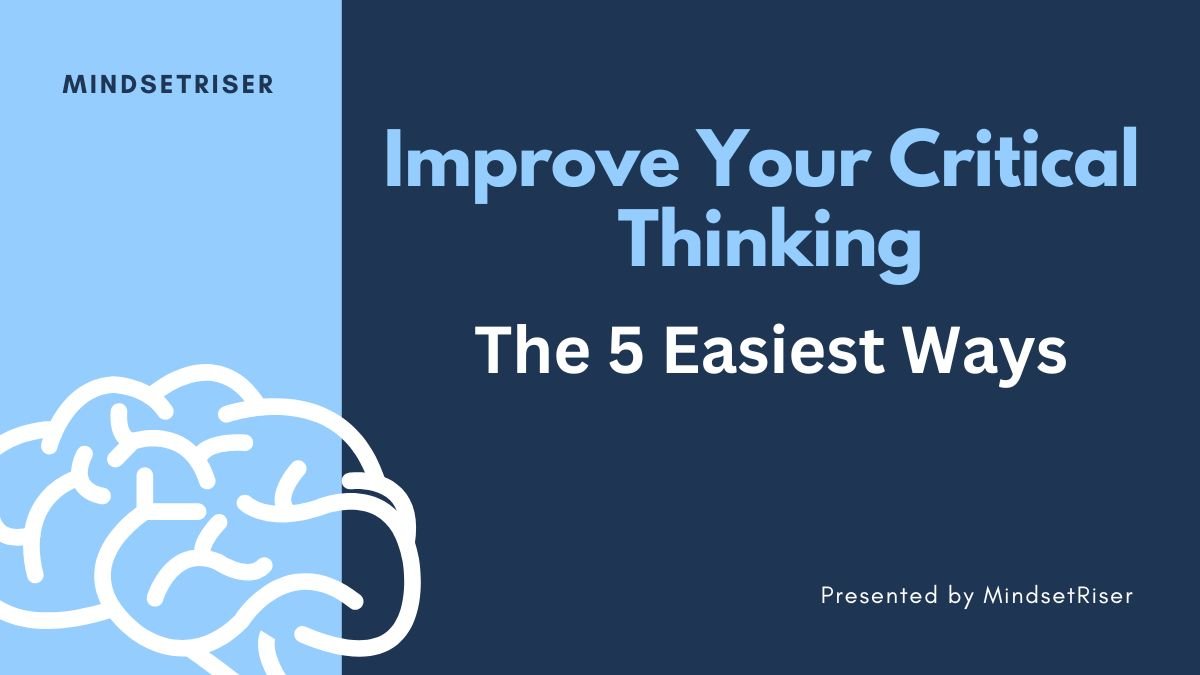5 Easy Ways to Improve Your Critical Thinking Skills
Introduction
Critical thinking is one of the most important skills you can develop, both in your personal and professional life. Whether you’re solving problems, making decisions, or analyzing information, critical thinking helps you navigate complex situations with clarity and logic. But what exactly is critical thinking, and how can you improve it?
In this article, we’ll discuss 5 easy ways to improve your critical thinking skills and start applying them to everyday life. From questioning assumptions to thinking outside the box, these strategies will help you think more clearly and make better decisions.
What is Critical Thinking?
Critical thinking involves the ability to think clearly and rationally, understanding the logical connection between ideas. It requires analyzing, evaluating, and synthesizing information rather than just accepting it at face value. A critical thinker doesn’t simply believe things—they evaluate the evidence, consider alternatives, and come to reasoned conclusions.
Improving your critical thinking skills will allow you to become a better problem solver, make smarter decisions, and understand situations from multiple perspectives.
Why Critical Thinking Matters
Before diving into the “how,” let’s explore why critical thinking is important:
- Better Decision Making: Critical thinkers can weigh the pros and cons of a situation before making a decision, leading to better choices.
- Enhanced Problem-Solving: Critical thinking helps you break down complex issues and find solutions logically and efficiently.
- Increased Objectivity: Critical thinkers are less likely to be swayed by emotions or biases, allowing them to remain objective in their analysis.
- Improved Communication: By thinking critically, you can express your ideas clearly and back them up with well-reasoned arguments.
Now, let’s look at some practical steps to enhance your critical thinking skills.
5 Easy Ways to Improve Your Critical Thinking Skills
1. Question Assumptions
One of the key components of critical thinking is questioning assumptions—both your own and those of others. People tend to believe things simply because they’ve always been told or because they seem logical on the surface. To think critically, you need to dig deeper and challenge assumptions.
- Ask Why: When you encounter an idea, concept, or piece of information, ask “Why is this true?” or “What is the evidence behind this?”
- Examine Other Perspectives: Try to understand the topic from different viewpoints. This will help you avoid confirmation bias, where you only seek information that confirms your existing beliefs.
By questioning assumptions, you begin to see the world more critically, uncovering biases and discovering new insights.
2. Practice Active Listening
Effective critical thinking starts with active listening. When you listen carefully, you’re able to better understand and analyze the information you receive, which is crucial for drawing logical conclusions.
- Listen Without Judgment: Avoid forming an opinion before you fully understand the idea being discussed.
- Paraphrase: To ensure comprehension, repeat back what you’ve heard in your own words. This helps you retain information and clarify any misunderstandings.
- Take Notes: Writing down key points can help you stay focused and organize the information for later analysis.
Active listening encourages deeper understanding and ensures that you’re not just absorbing information passively, but engaging with it thoughtfully.
3. Consider the Source
In today’s information age, not all sources are reliable. To think critically, you need to evaluate the credibility of the information you encounter. Is the source reputable? Is there evidence to support the claims being made? Always be skeptical of unverified information and seek out credible sources.
- Check Author Credentials: Who is behind the information? Are they an expert in the field?
- Evaluate Bias: Is the source trying to persuade you toward a specific point of view? If so, be aware of the potential bias and weigh it accordingly.
By carefully assessing the reliability of the information, you ensure that your conclusions are based on solid foundations rather than unreliable or biased sources.
4. Think in Terms of Cause and Effect
Critical thinkers understand that actions have consequences. When approaching a problem or decision, consider the cause and effect relationships involved. Ask yourself, “What are the possible outcomes of this action?” and “What might be the unintended consequences?”
- Map Out Scenarios: When considering an option, list the potential results, both positive and negative, of each choice.
- Look Beyond the Obvious: Don’t just focus on the immediate effects. Think about long-term implications as well.
This approach allows you to think beyond the surface and consider the broader impact of your decisions, leading to more informed and thoughtful conclusions.
5. Engage in Reflective Thinking
Reflective thinking is the process of examining your thoughts and actions to improve future decision-making. To develop your critical thinking skills, you should regularly reflect on your own thinking and the reasoning behind your decisions.
- Ask for Feedback: Seeking feedback from others on your thoughts or decisions can provide new insights and areas for improvement.
- Keep a Journal: Writing down your thought processes, decisions, and their outcomes can help you analyze what worked and what didn’t.
- Self-Assessment: Periodically assess your thinking skills. Are you jumping to conclusions? Are you considering all perspectives? Identifying areas for growth will help you continuously improve your critical thinking.
Reflecting on your thinking helps you recognize patterns in your reasoning and improve your ability to think more clearly and logically.
Conclusion
Improving your critical thinking skills is a lifelong process, but it’s one that will pay off tremendously in both your personal and professional life. By questioning assumptions, practicing active listening, considering the source of information, analyzing cause and effect, and engaging in reflective thinking, you can become a more effective and insightful thinker.
Remember, critical thinking isn’t just about being analytical; it’s about being open-minded and willing to challenge your own beliefs. Start practicing these strategies today, and you’ll notice an improvement in your ability to evaluate information, make better decisions, and approach problems with clarity and confidence.
Key Takeaways
✅ Question assumptions to uncover hidden biases and challenge established beliefs.
✅ Practice active listening to understand and analyze information more effectively.
✅ Evaluate the credibility of sources to ensure your conclusions are based on reliable information.
✅ Consider cause and effect when making decisions, considering both short-term and long-term impacts.
✅ Engage in reflective thinking to improve your reasoning and learn from past experiences.

